Army ranks and insignia of the Russian Federation
The Russian Federation inherited the ranks of the Soviet Union, although the insignia and uniform were altered slightly.
| Armed Forces of the Russian Federation |
|---|
.svg.png) |
| Staff |
| Services (vid) |
| Independent troops (rod) |
| Special operations force (sof) |
| Other troops |
|
| Ranks of the Russian Military |
| Uniforms of the Russian Military |
| History of the Russian military |
The Russian Armed Forces have two styles of ranks: army-style ranks and navy-style ranks. The army and air force use only army-style ranks.
Ranks and insignia
The following is a table ranks of the armed forces of the Russian Federation. English translation is given first, followed by Russian version, then by English transliteration.
Officers
| Category | Troop ranks | Parade uniform insignia | Everyday uniform insignia | Field uniform insignia | NATO equivalent |
|---|---|---|---|---|---|
| Supreme officers or general officers |
Marshal of the Russian Federation[Note 1] (Ма́ршал Росси́йской Федера́ции) |
 |
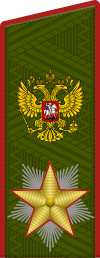 |
 |
OF-10 |
| Army general/general of the Army (Генера́л а́рмии) |
 |
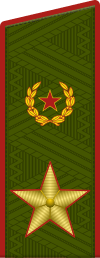 |
 |
OF-9 | |
| Colonel general/general (Генера́л-полко́вник) |
 |
 |
 |
OF-8 | |
| Lieutenant general (Генера́л-лейтена́нт) |
 |
 |
 |
OF-7 | |
| Major general (Генера́л-майо́р) (Generál-mayór) |
 |
 |
 |
OF-6 | |
| Senior officers or field grade officers |
Colonel (Полко́вник) |
 |
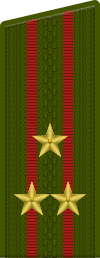 |
 |
OF-5 |
| Lieutenant colonel (Подполко́вник) |
 |
 |
 |
OF-4 | |
| Major (Майо́р) |
 |
 |
 |
OF-3 | |
| Junior officers or company grade officers |
Captain (Капита́н) |
 |
 |
 |
OF-2 |
| Senior lieutenant/first lieutenant (Ста́рший лейтена́нт) |
 |
 |
 |
OF-1 | |
| Lieutenant/second lieutenant (Лейтена́нт) |
 |
 |
 | ||
| Junior lieutenant/lieutenant junior grade (Мла́дший лейтена́нт) |
 |
 |
 |
Acting officer | |
| Student officers | Officer cadet (Курсант) |
 |
-2010.svg.png) |
OF-(D) |
Non-officer ranks
| Category | Troop ranks | Parade uniform insignia | Everyday uniform insignia | Field uniform insignia | NATO approximate[1] |
|---|---|---|---|---|---|
| Praporshchik | Senior ensign/Senior warrant officer (Ста́рший пра́порщик) (Starshy praporshchik) |
 |
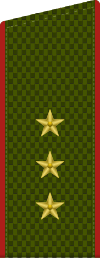 |
 |
OR-9 |
| Ensign/Warrant officer (Пра́порщик) (Praporshchik) |
 |
 |
 | ||
| Sergeants | Petty officer/Sergeant first class (Старшина́) (Starshina) |
 |
 |
||
| Senior sergeant/Staff sergeant (Ста́рший сержа́нт) (Stárshiy serzhánt) |
 |
 |
OR-7 | ||
| Sergeant (Сержа́нт) (Serzhánt) |
 |
 |
OR-6 | ||
| Junior sergeant (Мла́дший сержа́нт) (Mládshiy Serzhánt) |
 |
 |
OR-5 | ||
| Soldiers and yefréytors | Gefreiter/Corporal (Ефре́йтор) (Yefréytor) |
 |
 |
OR-4 | |
| Ryadovoy/Private (Рядово́й) (Ryadovóy) |
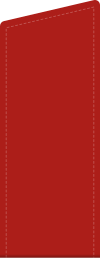 |
 |
OR-1 | ||
Rank titles are sometimes modified due to a particular assignment, branch or status:
- The ranks of servicemen assigned to a "guards" unit or formation are preceded by the word “guards”;
- The ranks of servicemen in the legal, medical and veterinary branches are followed by “of justice”, “of the medical service”, and “of the veterinary service”, respectively;
- The ranks of servicemen in the reserve or retired are followed by “of the reserve” or “in retirement”, respectively;
- The rank descriptor "of aviation" was officially abolished but is still commonly used.
Rank reform (2008)
As a result of the 2008 to 2011 defense reform the Russian Army's 90,000 warrant officer positions have been removed but on 27 February 2013 the expanded board of the Ministry of Defence of the Russian Federation, Russian Defence Minister S. Shoigu announced the return of the warrant officer to the Armed Forces of Russia.[2]
Insignia reform (2010)
On March 11, 2010, Law No.2010-293 of the President of Russia introduced a new set of rank insignia. Privates, airmen and seamen now wear plain shoulder epaulettes. Senior NCOs had their chevrons replaced by plain bars (small horizontal bars for corporals and sergeants increasing in number with seniority, large horizontal bars for staff sergeants, and vertical bars for master sergeants). These rank badges mirror the insignia of both the Imperial Russian Army and the Soviet Army in the 1970s. Warrant officers and officers received new shoulder rank epaulettes and all general officer insignia now reflect service affiliation in the duty dress uniform. The parade dress gold epaulettes have been retained. The insignia for a marshal of the Russian Federation retained the coat of arms of Russia and the marshal's star.
Rank and insignia reform (2013)
In 2013 the insignia of an army general now include the marshal's star, surmounted by a red star in a wreath. Starting Spring 2013 the warrant officer ranks of the RGF were reinstated, the first appointments to be given out later that summer.
See also
Notes
- The rank of marshal of the Russian Federation, the highest in the Russian Army, is not presently held by anyone in the modern armed of the Russian Federation. The only officer to hold the rank is the former Minister of Defense Igor Sergeyev, who was elevated from commander (army general) of the Strategic Rocket Forces. As it stands, marshal of the Russian Federation should be considered an honorary title equivalent to a field marshal, marshal or five-star general in other countries, created in the event of a major war or as the result of extreme military accomplishment (see marshal of the Soviet Union).
References
- NATO (2010). STANAG 2116 NATO (6th ed.). Brussels, Belgium: NATO Standardization Agency. p. D-1.
- http://www.5-tv.ru/news/72342/ in Russian
External
- Federal Law No. 58-FZ from March 12, 1998 "On military duty and military service" (in Russian)
- Presidential Decree No. 531 from May 8, 2005 "On military uniform, rank insignia of the servicemen and state bodies' rank insignia" (in Russian)
- Military ranks of Russia